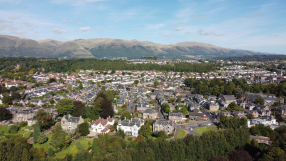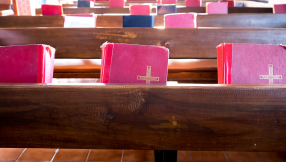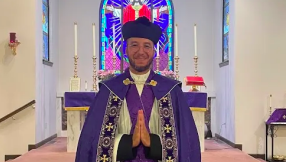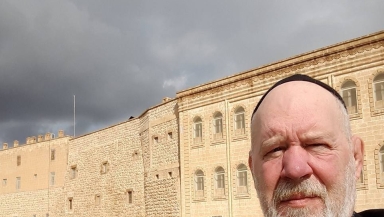
When Father Dale Johnson was ordained as a Syriac Orthodox priest on July 28, 1991, his bishop imparted a powerful message: "You are to be a bridge between us and the diaspora. And this will be your mission: to be a voice and stand in the gap between an ancient church that should not be relegated to a museum, but a church that should continue to live".
It's a mandate that has taken Johnson all over the world, from his native US, to Europe and China. For the past three decades, he's spent the majority of his time in the Middle East; mostly in southeast Turkey, northern Iraq and Syria, where he's witnessed the exodus of millions of religious minorities including Christians, Shia Muslims and Yazidis. Now 65-years-old, he lives as a monk, travelling around the diaspora and helping refugees of all creeds and none. He's currently working in camps in Germany, where more than a million people have fled the ongoing atrocities perpetuated by groups such as Islamic State.
In an extended interview with Christian Today, Johnson said he sees his work as a vital part of the Church's mandate to help the persecuted and vulnerable. He conducts services and prays with refugees in Syriac – a dialect of Aramaic, the language of Jesus – which he says forms part of the healing process for people who are thousands of miles from home. "It's something known; they know the songs, they feel at home again, even though they're in a foreign land," he says. "It's something familiar. What I can provide is prayer in their own language that they learned as children, and liturgical movements that are familiar to them. All this brings healing."
Faith is a "real anchor" for the majority of refugees who make it as far as Germany, Johnson adds. Many of those he meets have been on road for two full years. "I am constantly amazed at how tough they are, and yet as I interview them, they often admit to having nightmares. They are wounded, physically and spiritually, and are carrying with them suffering that isn't visible on the surface."
But Johnson is determined that those in most desperate need are the persecuted who remain in the Middle East. "The most vulnerable people are not those who have made it here [to Europe], but it's those who have been left behind," he explains. "The elderly, the disabled, those who don't have the funds or means or opportunity to leave. They're the most needy. We're only doing half our job if we just serve the refugees who are strong enough to get here. I believe it's our moral obligation that for every person to arrive here in diaspora, to help at least one other who's back in the Middle East."
It's out of this determination that Johnson's initiative, 'Seeds of Hope', was born. Two years ago, he was asked by a Turkish bishop to meet with refugees in the region and find out what their needs were. He took a team into Iraq, where they spoke to more than 2,000 families. Johnson says he had dreams and "grandiose ideas" of launching an NGO, but it was when he was speaking to a woman who'd fled Mosul – now an ISIS stronghold – that he felt called to found something far simpler.
"I had been crying all day, I had no tears left, when I was holding an elderly woman's hand and she got mad at me," he recalls. "She looked up and said, 'Just give me some seeds so I can go home, plant a garden and feed my family.'"
Johnson describes it as a "luminous moment". "I wanted to map out a grand plan... and this was just the simple, powerful voice of a mother advocating for her family."
Seeds of Hope gives land, gardening tools and seeds to families who have fled ISIS; allowing them to grow vegetables, the dignity to provide for themselves, and ultimately – hope. The initiative has already been rolled out at a refugee camp in Dahuk, in the Nineveh province and at several locations in southeast Turkey. A number of monasteries have offered their land, and at the Midyat refugee camp just outside of Mardin, some 10,000 people – mostly Yazidis – have been invited to take part.
Johnson evidently feels a call to protect his people's ancient culture in the Middle East, and praised the small number of priests and monks who have decided to stay.
"For 30 years I have been working in this region, and wave after wave of folks from my faith community and other religious minorities have left the Middle East," he says. "There's a dawning realisation among many Syriac Orthodox Christians that if this last remnant leaves, that is the end. There's a very strong sense of that, so much so that it's caused some of the people in southeast Turkey, northern Iraq and northern Syria to say maybe we shouldn't leave, even if we can, maybe we should stay – we're the last ones."
Those who chose to stay are "holding on to cultural icons," Johnson continues. "The Gabriel Monastery [in southeast Turkey, where Johnson has previously lived] was built in the year 327. These are fantastic, living institutions that go almost all the way back to the time of Christ, and somebody has to stay.
"Frankly, we're holding on by our fingernails, and in many cases there are just one or two monks or a priest in a building or village. If we leave, we lose it. And we've already lost dozens and dozens, if not hundreds, of ancient treasures and sites in this region we call Tur Abdin: the mountain of the servants," he says.
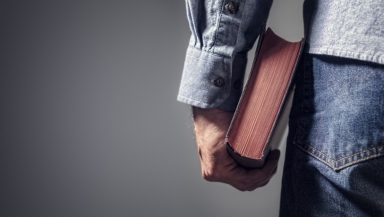
"We're holding on to the history of Christianity," he adds. "On the one hand, it's just a pile of rock and shouldn't be that important – our culture and cultural memory should not be based on something physical. But it is! It's like having your grandmother's teacup; when you hold it, you feel close to her. So we're holding on."
Johnson's passion is palpable, and he attributes it to his own upbringing. His father committed suicide when he was just a young boy, and so he was raised by an adoptive family, who were devout Lutherans. "I got a second chance at life, being raised by a wonderful family. I think at some deeper level this is part of the connection: these [refugees] are people who need to be adopted by the West, and rescued from difficult circumstances."
But though passionate, he's by no means naive. He's been kidnapped twice by militant groups in Iraq, once in 1991 when he was held for three days, and again four years later. That time, he was held for four months; being moved around by his captives from mosque to mosque.
So is he afraid of being targeted again? "No, I can't fear for my own life," he says, simply. "I'm not immune to danger, and have no special halo over my head. I'm just as much vulnerable as anyone else... [But] you can either be crushed by such experiences, or you can allow it to ennoble you."











